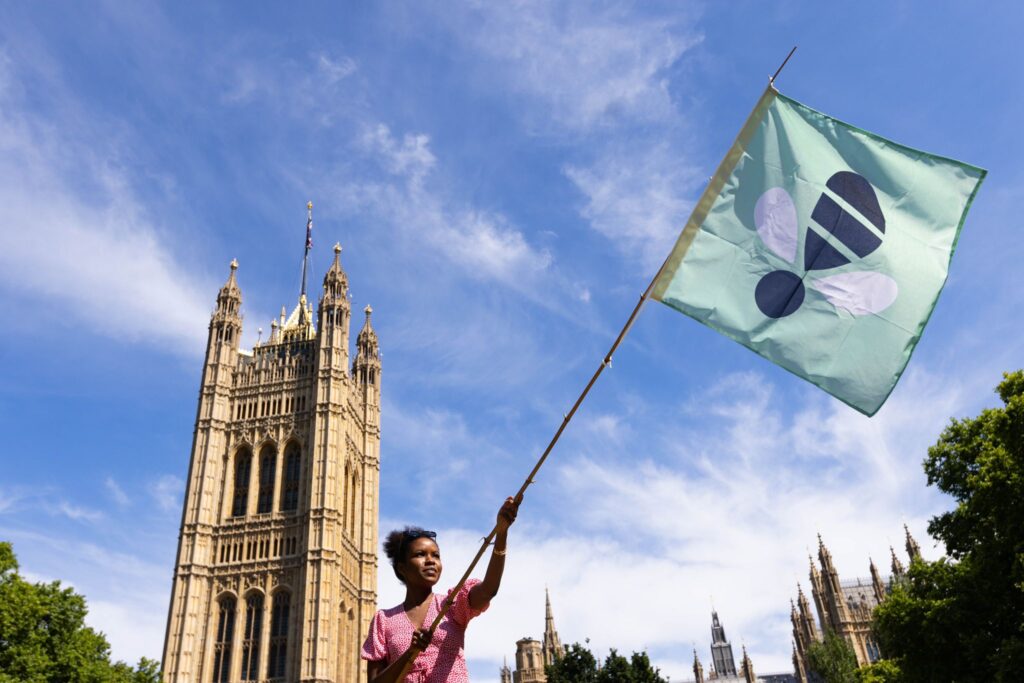‘The Nation Needs You!’: People of faith,
the Climate & Ecology Bill, and the general election
– By Jamie Russell

Photo Credit: Zero Hour
In this blog, Jamie Russell from Zero Hour, the campaign supporting the Climate & Ecology Bill in Parliament, talks about their new campaign. Jamie works as Zero Hour’s grassroots manager and has many years’ experience as a campaigner on climate and nature issues in Shropshire and nationally.
The best kept secret in Westminster is the date of the general election. Will it be May, November, or perhaps as late as possible in January 2025? No one knows. But at Zero Hour we do know this: whoever wins, the next Parliament is the most important of our lives.
The next Parliament will take us to 2030, a key date in the UK’s legally-binding pathway to tackle the climate and nature crisis. The year 2030 is the IPCC target by which the world needs to halve emissions to avoid climate catastrophe. It is also when the UK is committed to protecting and conserving a minimum of 30% of land and sea for biodiversity (known as the ‘30 by 30 commitment’).
That’s why, ahead of the general election, we’re launching our new campaign ‘The Nation Needs You!’
After years of raising awareness about the Climate & Ecology Bill (CE Bill), we’ve learned that the power for change isn’t centred in Westminster. It’s found in communities up and down the UK.
From local councils and faith groups to charities, businesses, and sports clubs, power belongs to the people. And it’s people power that can change Westminster policy. Just look at what the public response to Mr Bates Vs The Post Office achieved!
Elections are the moment in the political cycle when those who want to be our next MP are most likely to listen to us. A cynic would say that this is because candidates want our votes. While this might be true, election campaigns are also when candidates spend six weeks immersed in their local communities, listening to a broad range of views.
This is why our new campaign to support the CE Bill is constituency-based and people-focused. It focuses on bespoke open letters in support of the CE Bill in each of the UK’s 650 constituencies.
By asking local residents, businesses, charities, and community organisations to sign and share their local open letter, we want to use the collective power of individuals and community organisations. Our aim is to show candidates from all parties that they have a mandate from their constituents to support this vital legislation if elected to Parliament.
To achieve this, we are mobilising local people through existing community networks. Joining forces with over 500 national organisations – from The Women’s Institute to The Co-operative Bank, the CPRE, and Oxfam – we’re reaching out to people across the UK.
Of course, the people who know a constituency best are the people who live there, worship there, volunteer there, and call it home. We need that expert local knowledge to ensure the open letters get as much support as possible in each constituency.
Faith communities are key allies in this. Immersed in the local community, with connections across the constituency and beyond, these groups are often the glue that holds communities together. They provide vital support and social networks, helping people take a pause and reflect on our place on this earth, reconnecting us to our heritage and nature, and grounding us with important values related to the preservation of life and future generations.
What’s more, these organisations possess real ‘clout’ in the eyes of candidates who know they represent a diverse range of constituents and showcase the values of the communities they serve. They also have incredible access to influential thinkers and spiritual leaders who can help us bring the urgent need for this legislation to people’s attention locally as well as nationally.
The climate and nature crisis is not just a ‘green’ crisis. It’s also a crisis of compassion. As we see increasing climate impacts in our communities – not to mention the devastating impact on those on the frontline of the crisis in the Global South, most of whom bear the least responsibility for it – tackling the crisis will not simply require ‘listening to the science’. It will also entail embedding the ethics, morality, and love that is at the heart of faith into our broken social, political, and economic systems.
US climate activist Bill McKibben says that the most important thing people can do to tackle the climate crisis is to stop acting only as individuals and take action together. Religious communities are built around the power of the collective. This power is found in churches, mosques, synagogues, temples, gurdwaras, meeting houses, and other faith spaces. That is why we hope faith groups will get behind our new campaign and support it.
We need you.
28/02/2024
